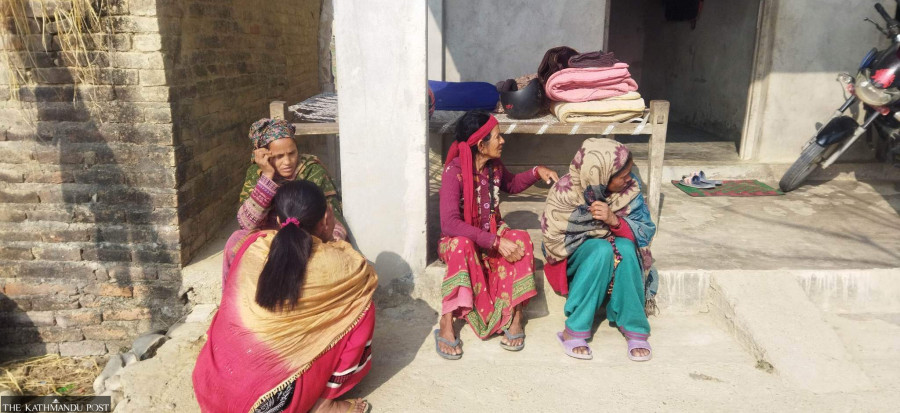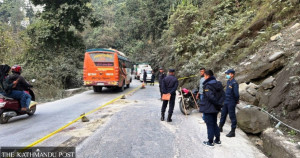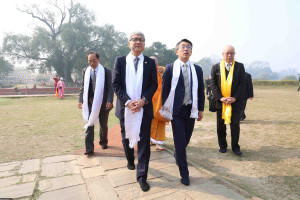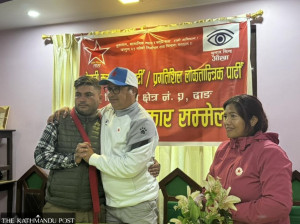Lumbini Province
Beset by poverty at home, Banke women face horror abroad
Several debt-ridden Nepali women who illegally visited Gulf nations for jobs are in captivity and crying for help.
Rupa Gahatraj
For the past month, Pramila Baidar’s husband, Resham Baidar, has been making rounds of various government offices, requesting officials to help him repatriate his ailing wife from Oman. Every time, he has returned disappointed.
“None of the authorities have helped me,” Resham laments, adding that he was in the hospital when his wife left for Oman without informing him four months ago. “She didn’t share her travel plans with anyone in the family fearing we would stop her. She contacted us only when she was taken ill. She needs immediate medical attention and we need to bring her back.”
Pramila, 41, was diagnosed with intestinal cancer a couple of months before she left for the Gulf nation through illegal channels to work there.
The debt burden accumulated during her preliminary treatment is what forced her to make the risky move, says Ajaya Baidar, Pramila’s brother. Since Resham also hasn’t been keeping well for the last few years, the responsibility of caring for him and their two children had fallen solely on Pramila’s shoulders. She took out a loan from a local cooperative last year to cover treatment costs and living expenses. The cooperative threatened Pramila with legal consequences for defaulting on the loan. That was when her neighbour, Rahul Shahi BK, suggested she go aboard to earn money. BK assured her that if she went to Oman, she would get treated for cancer and post recovery, he would arrange a job for her as a domestic help.
“The prospect of getting treated and even earning money was alluring for Pramila,” said Ajaya. “But for the past three months, she has been held hostage in Oman. She contacted me a couple of days ago and told me that the ones holding her have asked her to pay Rs350,000 if she wants to go home. We can’t afford to send the money for her release.”
Pramila flew to Oman from Delhi on November 3 last year. Upon reaching Oman, her health condition worsened, and she frequently lost consciousness. However, instead of providing the promised medical treatment, she was asked to return the money the agents had spent on her travel and stay in Oman.
Pramila is a resident of Pitmari, a squatter settlement in Baijanath Rural Municipality, Banke. The settlement is home to around 600 Dalit families. Most of the families are surviving on loans from local cooperatives and loan sharks. As unemployment is rife for a lack of income earning avenues, several women and girls find their way to Gulf nations through unreliable sources running illegal channels.
These days, Pitmari is almost empty of womenfolk, says Prakash Bahadur Shahi, chairman of the local unit. “We are running awareness campaigns in settlements like Pitmari so they understand the risk of moving abroad through illegal channels,” said Shahi. “But as they go through illegal channels their families approach us only after the women reach the host countries and fall into an agent’s trap. It becomes very difficult to rescue them.”
The rural municipality is currently collecting data on the exact number of women and girls who have left for Gulf countries and are being held captive. “We are also taking initiatives to bring this growing issue to the notice of the authorities concerned,” Shahi said.
Following several cases of exploitation, the government had prohibited women from going abroad for domestic work in 2017. The ban has been lifted and reimposed multiple times.
Currently, the government has restricted women domestic workers from going to work in nine Gulf countries—Saudi Arabia, Kuwait, the United Arab Emirates, Oman, Bahrain, Iraq, Libya and Lebanon.
Asha Pariyar, a 42-year-old woman from Pitmari, left for Kuwait two months ago and is currently being held captive by local agents, according to her family. Asha too had taken out a loan of Rs500,000 from a cooperative but had defaulted on her monthly instalments.
Sapana Pariyar, Asha’s 20-year-old daughter, said her mother saw no recourse to paying the loan than to go to Kuwait. Asha applied for her passport and went to Kathmandu to collect it in August 2022. Asha’s husband works in India so she left her two children in Sapana’s care. She got a job as a domestic help in Kuwait but she was soon fired. “Since then she has been trying to return to Nepal,” Sapana says. “But the agent has kept her holed up in a room and refused to let her go until she pays for the expenses incurred so far and for her flight back home.”
The family is in no condition to send any money to bring Asha back home from Kuwait, says Sapana. “We can’t even borrow as we already have so much debt to clear.”
Sita BK also went to Kuwait a month ago and has been held captive there, according to Sita’s husband, Raju BK. A daily wage worker, Raju says it was getting difficult to put food on the table, especially after the birth of their son.
“Financially, we were stretched thin,” Raju says. “We were struggling when an agent came to us and told us of the benefits of going abroad to earn money.” The agent told them they would be able to secure the future of the newborn, so Sita was tempted.
Things haven’t gone as planned. While in Kuwait, Sita suffered from bouts of weakness which hampered her output at her job, prompting her employer to fire her. “She’s now being held in a room and the agent is putting pressure on us to send Rs250,000 if we want her to return home,” Raju says. “I don’t know what to do now.”
Kamala Pant, a human rights activist, says that since there is no state mechanism to inform citizens of the pitfalls of using illegal channels to venture abroad, women from poor backgrounds in Banke, most of them Dalits, have been risking their lives to go to the Gulf nations.
While some women have been able to inform their families back home about their predicament, most others have not. Those who do not know how to use or access technology are completely cut off from their families back home.
Pant says that many women, especially those from poor and marginalised backgrounds, move abroad with little to no knowledge about the country they are going to or the jobs they will be assigned to. “Once they reach there, their fates are sealed,” she says. “Only very few lucky ones get to realise their dreams while the others get trapped.”
To curb this phenomenon, the government should raise awareness on the perils of going abroad through illegal channels, bring the local agents to book, and create job opportunities for the poor and uneducated women in the country itself, Pant suggests.
Top Bahadur KC, Banke’s assistant chief district officer, blames lack of proper policies and laws to help those who leave the country using illegal channels for the plight of women stranded abroad.
Searching and rescuing Nepali women held captive in foreign countries is the responsibility of the federal government, KC says. “But the same service is not extended to those who leave through illegal channels,” he says. “It’s difficult to track those women as the government does not have any leads on them.”
Today, Pramila’s husband, Resham, is scrambling to bring his wife back home. Seeking help, he has visited the Ministry of Labour, Department of Labour and Foreign Employment and Department of Immigration in Kathmandu and various social organisations.
He has even filed a complaint with the Kohalpur Police Station after he got a call from Pramila. But the local agent, who goes by the name Rahul, is absconding and they have no other lead, Resham says, adding he is losing hope of seeing his wife again. “They [the police] said they will contact me if they make any progress but now it’s been more than three months,” he says. “I am extremely worried about my wife.”




 13.12°C Kathmandu
13.12°C Kathmandu














